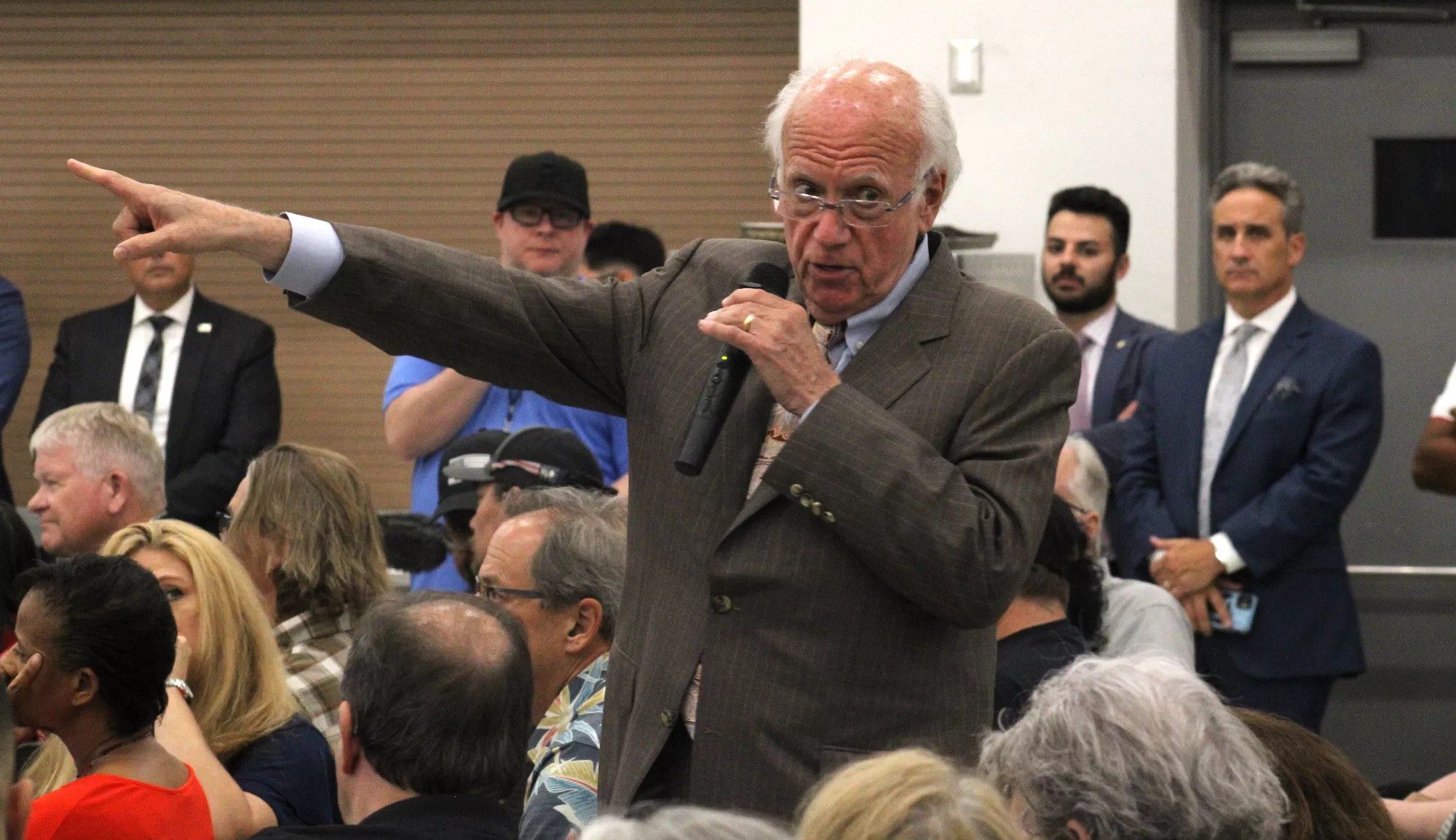
Morgan Fischer

Audio By Carbonatix
The meetings have happened four times a year for the last decade, and they tend to follow a similar script.
Robert Warshaw, the independent monitor appointed by a federal judge to conduct oversight of the Maricopa County Sheriff’s Office, gives an update on the agency’s efforts to comply with a court order. The Maricopa County sheriff – whoever it happens to be at the time – sits and takes his medicine from community members affected by the agency’s history of racial profiling and unconstitutional policing. Then everyone goes home and does it again in three months.
One such meeting was held on Wednesday at the Desert West Community Center in Maryvale, but this one was not like the others. While it was attended by many community members who are critical of the sheriff’s office, the meeting was also flooded with a sudden influx of pro-sheriff supporters, seemingly spurred to attend by local politicians who are upset at the mounting price tag of bringing the agency into compliance. More than 100 people attended.
And while the meetings are usually emotional and tense, this one went off the rails.
Heckling was rampant, including while both Warshaw and Democratic state Sen. Analise Ortiz spoke, though speakers from both sides endured interruptions. One attendee yelled at a sheriff’s office critic whom he heard tell a speaker to “go back to Mexico,” inciting a brief confrontation. Two attendees got pushy with each other when one tried to squeeze past the other.
At one point, Warshaw held his forehead in his hand, a photo of which was tweeted by the chief of staff of Maricopa County Attorney Rachel Mitchell.
“Tempers are high, emotions are high,” Community Advisor Board member Raul Piña told Phoenix New Times after the meeting. “Some very tense moments tonight. It’s stressful.”
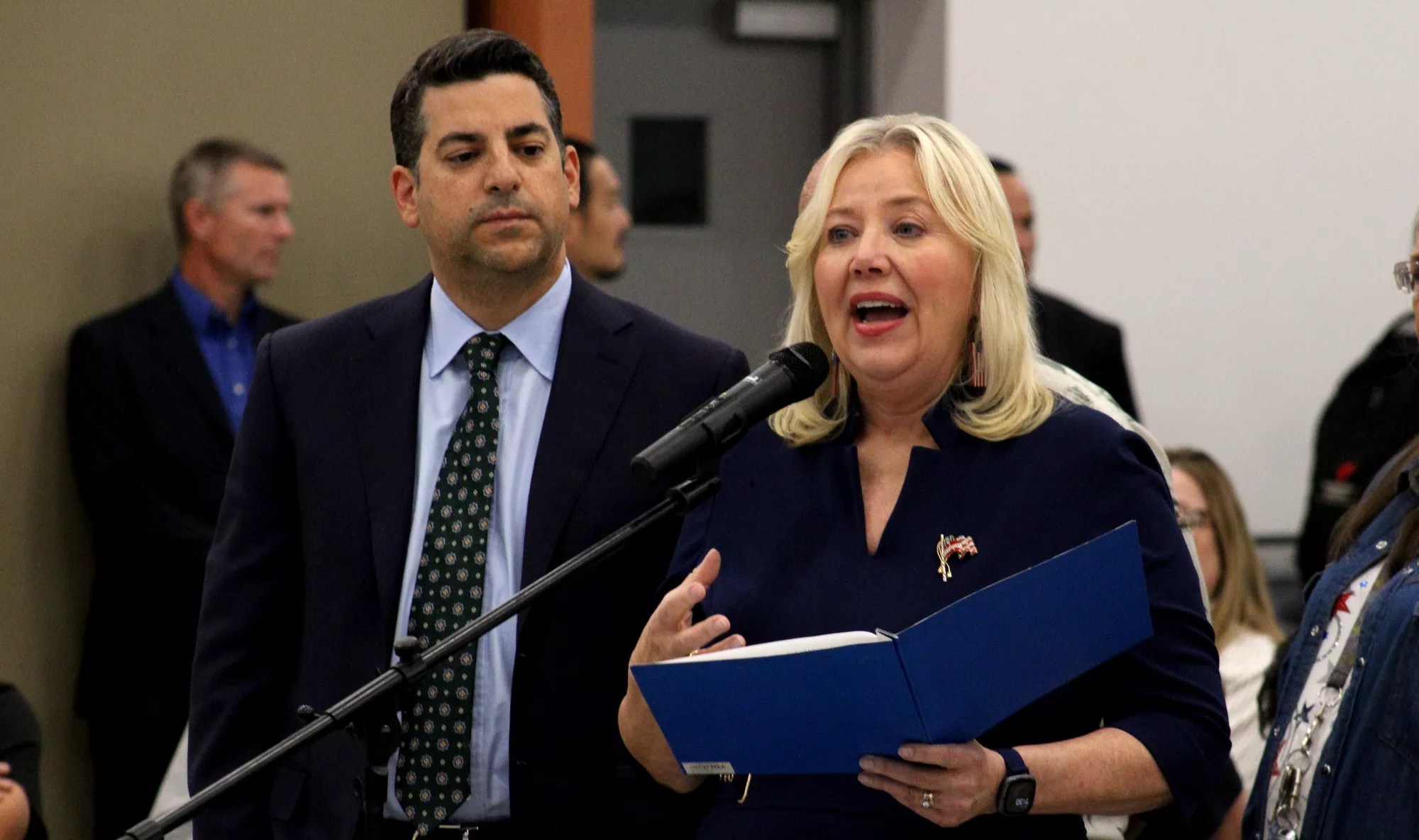
Maricopa County supervisors Thomas Galvin and Debbie Lesko criticized the federal monitoring of the sheriff’s office at a meeting in 2025.
Morgan Fischer
The meetings are required as a result of the federal civil rights lawsuit Melendres v. Arpaio, which found that the agency under then-Sheriff Joe Arpaio had been racially profiling people at traffic stops while conducting immigration sweeps in Latino neighborhoods. Warshaw leads the monitoring team that oversees the agency’s efforts to come into compliance with the orders of federal judge G. Murray Snow. It was Snow who appointed Warshaw to the post.
Normally, the meetings take on an anti-sheriff tone. In October, a sheriff’s deputy lectured the audience and stormed out following constant criticisms of then-Sheriff Russ Skinner. In February, current Sheriff Jerry Sheridan – who was Arpaio’s right-hand man – attempted to cancel his first meeting as sheriff, citing unfounded claims of potential violence.
Wednesday, seemingly in response to entreaties from the GOP-led Maricopa County Board of Supervisors, the composition of the crowd changed. Brandon Hiller, Mitchell’s chief of staff, gloated on X that word of Warshaw’s “secret” quarterly meeting had gotten out – never mind that the meeting is hardly secret and has been regularly covered by the press for a decade. Two Republican county supervisors, Debbie Lesko and board chair Thomas Galvin, spoke.
Lesko criticized the independent oversight of the sheriff’s office as money “being spent on federal bureaucracy.” The efforts to comply with Snow’s orders – which now largely hinge on the ability of the sheriff’s office to investigate and clear a backlog of resident complaints – are projected to cost Maricopa County nearly $350 million by 2026. Galvin claimed that county residents are “absolutely not… any safer because of the actions of this monitor.”
Fellow county supervisor Kate Brophy McGee and Republican gubernatorial candidate Karrin Taylor Robson were also in attendance. Robson stood in line to speak, but the meeting ended before she got a turn. Her GOP primary opponent, Rep. Andy Biggs, was not in attendance, although several attendees sported his campaign merch.
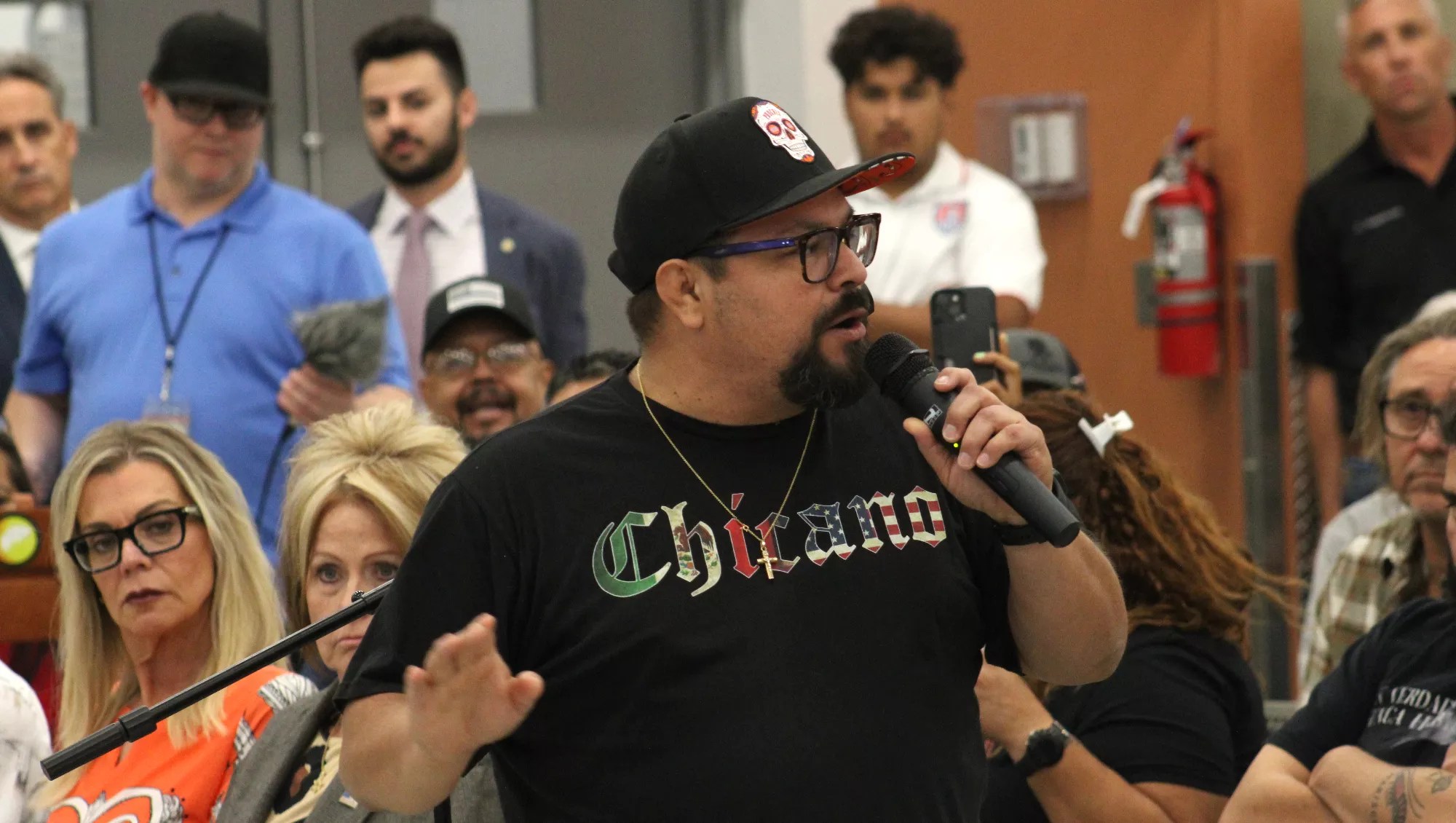
Common Defense organizer Ricardo Reyes got into a confrontation with a woman whom he said told another attendee to “go back to Mexico.”
Morgan Fischer
Compliance efforts
Despite Lesko and Galvin’s pressure campaign, the quickest way to end independent monitoring of the sheriff’s office is to fully comply with Snow’s order.
Though one attendee called for Warshaw to unilaterally “tear up that court order,” neither Warshaw nor anyone else at the meeting has the authority to do so. Only Snow can remove Warshaw from the position or decide to let the sheriff’s office off the hook – a fact that Galvin, Lesko and Mitchell surely know.
The sheriff’s office is relatively close to reaching compliance. It is in “full and effective compliance” with 92% of the orders that it must fulfill, with the complaint backlog the biggest looming issue. According to Warshaw’s most recent monitor report, published June 30, the backlog of Professional Standards Bureau investigations has dropped. However, the extended time it takes to complete these misconduct investigations “remains one of the biggest hurdles affecting MCSO’s ability to reach overall completion.”
To be found in compliance, any PSB investigation completed “on or after September 1, 2024 “must be “finalized and closed within 180 days.” The sheriff’s office has been falling short of that mark. During the most recent reporting period – during which Skinner was still sheriff – only 24% of complaints were investigated and completed within the required 180-day period, a drop from 29% during the previous reporting period. However, the monitoring team wrote that it was “optimistic” that the sheriff’s office would continue to chip away at the backlog of misconduct investigations.
Warsaw tried to explain this process as he walked up and down the aisle on Wednesday evening. “There may be some misunderstandings and that’s OK,” he said. “Is there still work to be done? Yes. Is this going to go on forever? No.”
“Will it?” one heckler in the audience mumbled toward Warshaw. “Eleven years is a long time.”
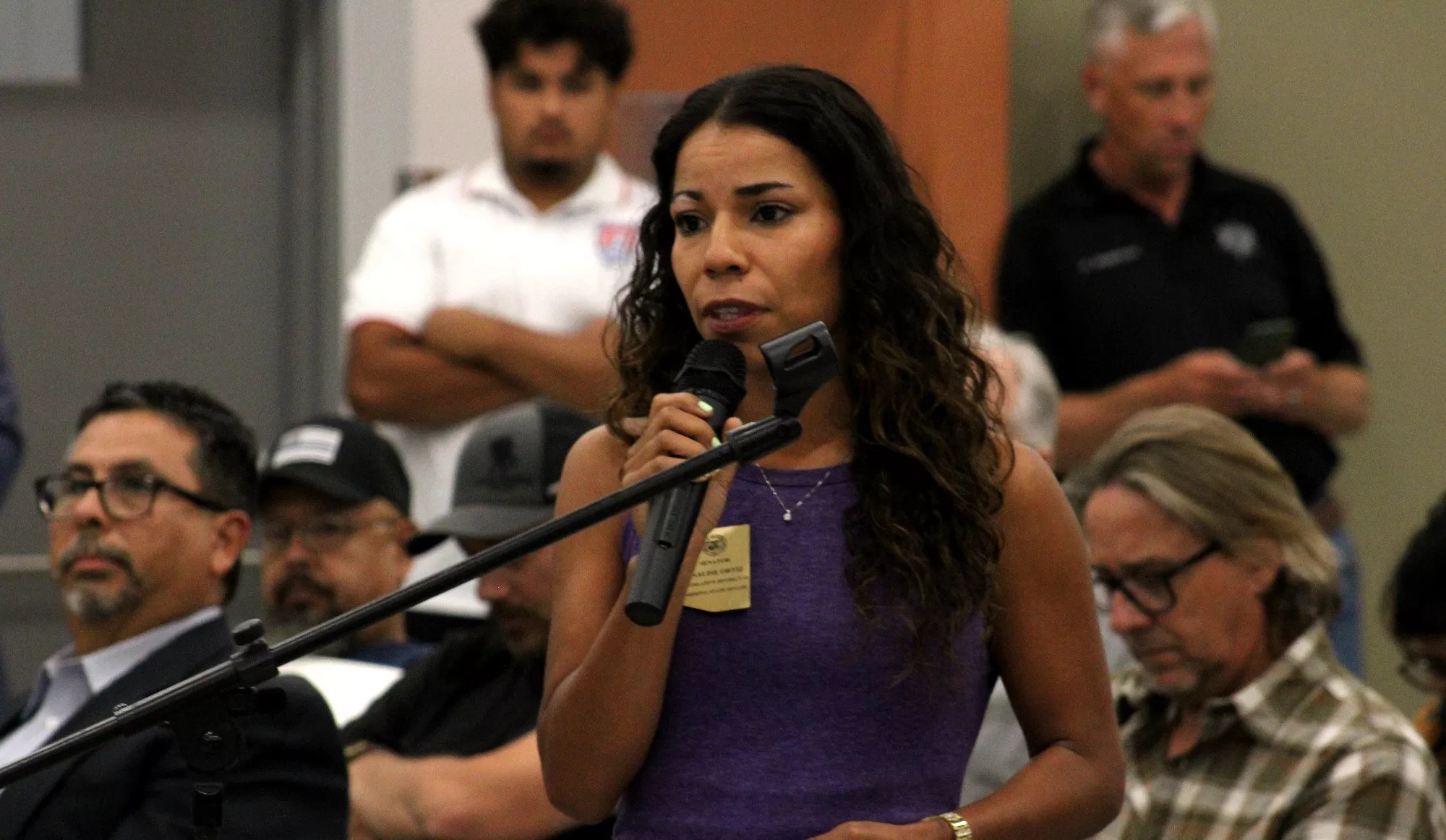
Democratic state Sen. Analise Ortiz, who was heckled throughout her comments at the meeting, said she felt “unsafe.”
Morgan Fischer
Despite constant calls to allow speakers to talk and limit interruptions, the proceedings were plagued by outbursts as well as verbal and even physical altercations. One speaker had everyone stand and recite the Pledge of Allegiance in the middle of the meeting. When speakers were told that they must be brief because the monitoring team only had the space until 8:30 p.m., some attendees murmured that if the translator didn’t speak Spanish after each speaker, it’d go quicker.
Because the victims of the sheriff’s racial profiling were largely Spanish-speaking, a translator is used at every meeting. At one point, an attendee interrupted the translator to ask, “Who speaks Spanish here?” Longtime immigrant rights activist Sal Reza raised his hand and said, “I do.” The man sat down and the translator continued to beg the crowd to allow her to do her job.
Ricardo Reyes, an organizer with the group Common Defense, confronted an older woman who he said told another speaker to “go back to Mexico.” When Reyes called her out, she tried to grab his phone. He slapped her hand away. Warshaw stepped in to defuse the situation, but bickering between attendees continued throughout the meeting. Reyes later posted a picture of the woman on X. New Times could not confirm that the woman made the comment.
Reyes recalled being pulled over by sheriff’s deputies and asked to show ID, suggesting that he’d been racially profiled. “You were part of the problem,” he told Sheridan. Democratic state Sen. Analise Ortiz, who represents the district where the meeting occurred, urged the monitoring to continue amid the Trump administration’s mass deportation policies. But she was heckled throughout her comments by a woman wearing a white vest in the front row of the meeting room.
“As an elected official, I feel unsafe in this meeting,” Ortiz said.
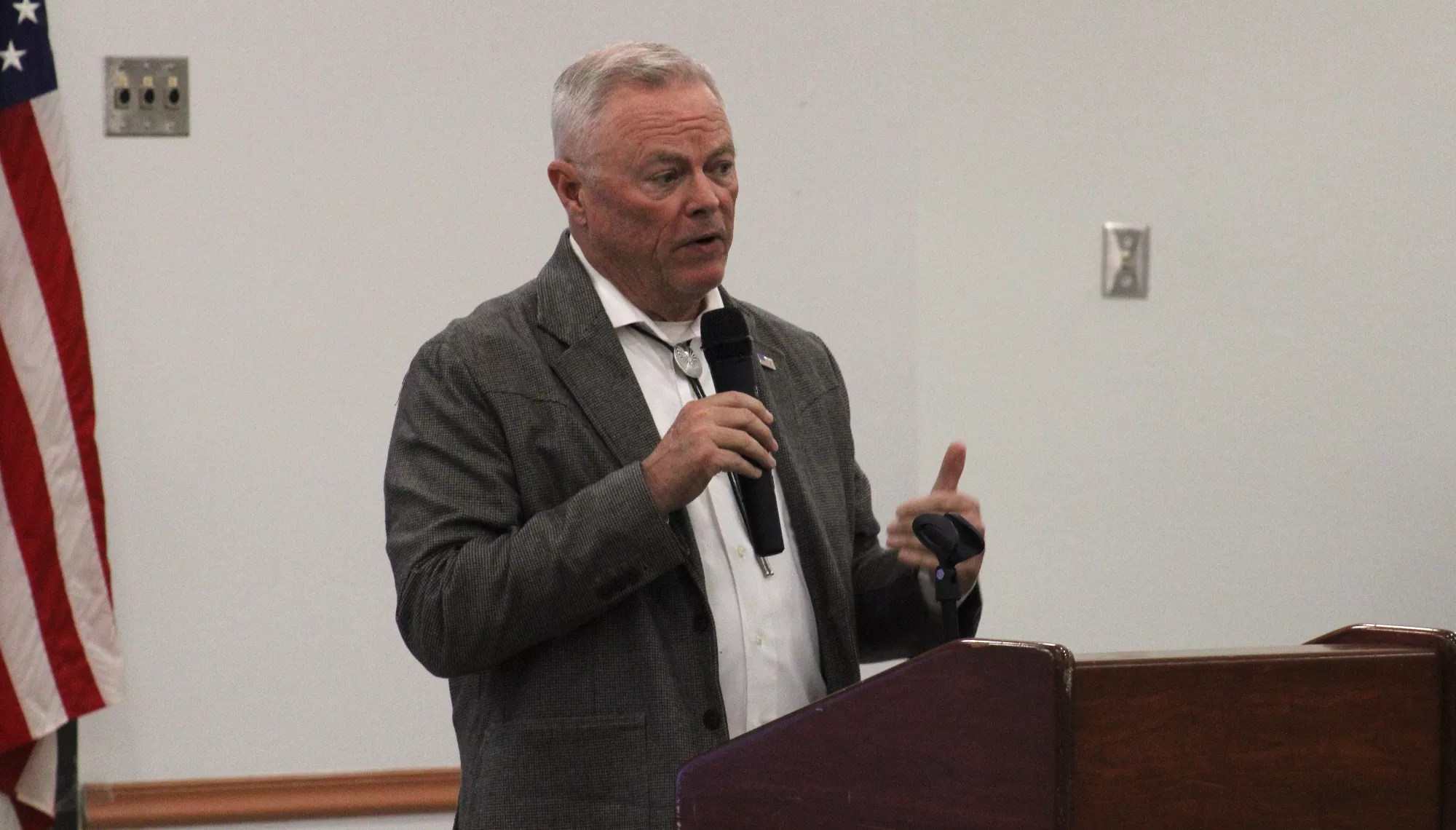
After the meeting, Maricopa County Sheriff Jerry Sheridan claimed he had “no idea” why so many sheriff’s office supporters showed up.
Morgan Fischer
Eventually, the time allotted for the meeting ran out. Meeting organizers turned off the microphones to usher people out of the building. Several attendees – including Maricopa County Republican Committee first vice chair Shelby Busch, an election denier who notoriously expressed a desire to lynch former Maricopa County Recorder Stephen Richer – continued to question Warshaw about the money spent on the monitoring of the sheriff’s office.
After the meeting, Sheridan was in a much better mood than he was following his first such meeting in office.
“Why everybody showed up? I have no idea,” Sheridan told New Times after the meeting, unconvincingly pleading ignorance. “I was happy to hear some positive things about the Sheriff’s Office and myself for a change.”
Three months from now, when another not-so-secret, regular-as-clockwork monitor meeting is held, it will be interesting to see if Sheridan – or Snow – has changed his tune.